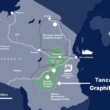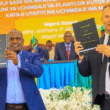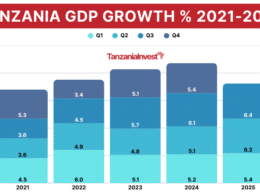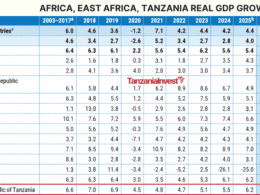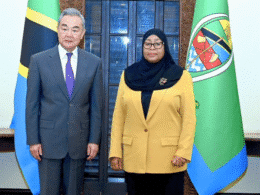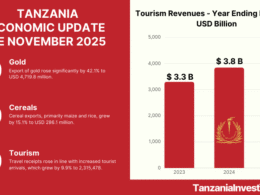TanzaniaInvest had the pleasure of interviewing Ms. Latifa Khamis, Director General of the Tanzania Trade Development Authority (TanTrade), the government agency tasked with promoting both domestic and international trade.
In this interview, Ms. Khamis discusses TanTrade’s initiatives in market research, export capability development, digital platforms, and policy advocacy aimed at improving Tanzania’s trade competitiveness.
She also highlights strategic growth areas such as agro-processing, seafood exports, and manufacturing, while emphasizing the government’s commitment to creating a business-friendly environment that welcomes global investment.
TanzaniaInvest: Can you give us an overview of TanTrade’s role and key objectives?
Ms. Latifa Khamis: TanTrade serves as Tanzania’s national export promotion agency under the Ministry of Industry and Trade. Our core mission is to increase exports of Tanzanian goods and services to regional and global markets.
To achieve this, we support local businesses with market intelligence, trade capability building, and direct market linkages.
“We support local businesses with market intelligence, trade capability building, and direct market linkages.”
We conduct research to identify high-potential export products and target markets, and organize outbound trade missions and international exhibitions where local companies meet pre-screened buyers.
Domestically, we host the Sabasaba International Trade Fair (DITF), a flagship event that offers companies a platform to showcase their products to both local and foreign visitors.
As the national trade fair regulator, we also issue permits and ensure compliance with exhibition standards.
On the policy front, we provide data-driven recommendations to the government on reforms needed to enhance export performance and adapt to shifting regional and global dynamics.
“On the policy front, we provide data-driven recommendations to the government on reforms needed to enhance export performance.”
Beyond export promotion, we work to position Tanzania as an attractive sourcing and investment destination.
TanzaniaInvest: What are some of the key challenges or bottlenecks that hinder trade growth?
Ms. Latifa Khamis: Over recent years, the government has made significant strides in removing regulatory bottlenecks and reducing bureaucracy for exporters and importers. We have shifted our mindset from controlling trade to enabling it.
At TanTrade, we continue to provide evidence-based advice to authorities to drive reforms. While regulatory improvements have been made, changing institutional mindsets remains an ongoing process. We want all officials to act as facilitators of trade rather than gatekeepers.
We are also enhancing the use of modern ICT tools to disseminate trade data and updates. Our leadership has worked to reduce non-tariff barriers, but there’s still work to be done in harmonizing efforts and aligning systems across different institutions.
TanzaniaInvest: What services and platforms does TanTrade offer to help local businesses access export markets?
Ms Latifa Khamis: Our core services aim to connect export-ready Tanzanian firms with international markets. We organize trade missions to priority markets, allowing companies to exhibit and meet buyers directly.
These efforts have led to agreements in sectors like agriculture, agribusiness, food science, and biotechnology.
We also advocate for the removal of nuisance levies and unnecessary bureaucratic procedures that increase the cost of doing business.
“We also advocate for the removal of nuisance levies and unnecessary bureaucratic procedures that increase the cost of doing business.”
Both the Mainland and Zanzibar governments are working toward aligning systems to streamline trade facilitation.
Our annual Export Readiness Training Programs equip SMEs with practical knowledge on export documentation, packaging, standards, trade finance, and other key areas. We also offer sector-specific workshops to boost competitiveness.
The TanTrade Trade Portal is a one-stop digital resource covering over 200 import and export products, offering step-by-step guidance on regulations, tariffs, procedures, and contact points.
“The TanTrade Trade Portal is a one-stop digital resource covering over 200 import and export products, offering step-by-step guidance on regulations, tariffs, procedures, and contact points.”
Thanks to government efforts, a Single Window Center has been created to centralize trade information.
This transparency has helped identify systemic issues, prompting the creation of a unified TRA (Tanzania Revenue Authority) electronic gateway to consolidate documentation, payments, and verification – a big step toward a true One-Stop Border Post.
TanzaniaInvest: What are the key sectors where Tanzania sees the most trade and investment growth potential?
Ms Latifa Khamis: Agro-processing holds huge promise. Tanzania produces a wide variety of fruits, vegetables, nuts, and spices – many of which are exported in raw form.
“Agro-processing holds huge promise. Tanzania produces a wide variety of fruits, vegetables, nuts, and spices – many of which are exported in raw form.”
With investment in processing technology, infrastructure, and expertise, we can significantly increase the value of these exports. For example, countries import French beans from Europe when Tanzania offers the same quality – this shows the potential.
Seafood exports are another high-potential sector, including products like Nile perch, tuna, seaweed, and crabs. Investment in modern fishing equipment, cold storage, processing facilities, and training will help us scale this industry and increase export earnings.
“Seafood exports are another high-potential sector, including products like Nile perch, tuna, seaweed, and crabs.”
Additionally, our mineral and energy sectors, including natural gas and rare earths, continue to attract strong international demand, particularly from countries like China, India, and the UAE. The focus is now on ensuring these exports lead to inclusive economic growth.
Other priority areas for investment include light manufacturing, logistics, tourism, and consumer goods, supported by Tanzania’s young population, geographic advantage, and expanding middle class.
TanzaniaInvest: How do regional trade agreements like EAC, SADC, and AfCFTA benefit Tanzanian businesses?
Ms. Latifa Khamis: Tanzania’s membership in regional economic communities like the East African Community (EAC), the Southern African Development Community (SADC), and the African Continental Free Trade Area (AfCFTA) opens up vast market opportunities.
Through the EAC-EU Economic Partnership Agreement, for example, our exporters gain duty-free access to European markets. At the same time, regional trade within EAC and SADC offers a practical starting point for SMEs to build capacity before scaling globally.
AfCFTA is a game-changer. It allows Tanzanian goods to access a consumer base of over a billion people across Africa. We’ve already seen improved competitiveness and are building capabilities to fully leverage these frameworks.
“AfCFTA is a game-changer. It allows Tanzanian goods to access a consumer base of over a billion people across Africa.”
TanzaniaInvest: What is your message to international investors considering Tanzania?
Ms. Latifa Khamis: Tanzania today offers a compelling blend of leadership commitment, strategic location, natural resources, and a vibrant, youthful population. Our government is focused on enabling – not obstructing – business, and reforms are ongoing to reduce red tape and enhance competitiveness.
“Tanzania today offers a compelling blend of leadership commitment, strategic location, natural resources, and a vibrant, youthful population.”
We welcome investors in agro-processing, manufacturing, logistics, tourism, energy, and other strategic sectors. Tanzania is not just open for business – it’s ready for growth. To our partners around the world: the opportunities are immense. Come grow with us.



